

City of Whitehorse - Shared Accommodation Housing. There has been increased demand for shared accommodation housing such as rooming/boarding houses, residential accommodation, student dormitories (managed by an educational facility) and hostels.
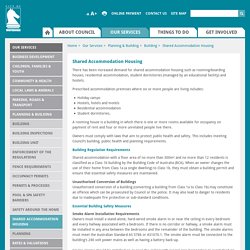
Prescribed accommodation premises where six or more people are living includes: Holiday camps Hostels, hotels and motels Residential accommodation Student dormitories. A rooming house is a building in which there is one or more rooms available for occupancy on payment of rent and four or more unrelated people live there. Owners must comply with laws that aim to protect public health and safety. This includes meeting Council’s building, public health and planning requirements. Building Regulation Requirements Shared accommodation with a floor area of no more than 300m² and no more than 12 residents is classified as a Class 1b building by the Building Code of Australia (BCA). Essential Building Safety Measures Exit DoorsExit doors must be maintained and clear of all obstructions at all times. Compliance. The Registered Accommodation Association of Victoria Ltd. Guest, Boarding, Rooming House or Hostel.
A boarding house, rooming house, guest house, hostel or the like generally require a Building Permit.
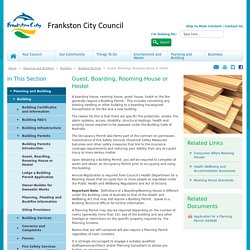
This includes converting any existing dwelling or other building to a boarding house/guest house/hostel or the like and a new building. The reason for this is that there are specific fire protection, smoke, fire alarm systems, access, disability, structural loadings, health and amenity issues required to be assessed under the Building Code of Australia. The Occupancy Permit also forms part of the contract on permission, maintenance of Fire Safety Services (Essential Safety Measures) balconies and other safety measures that link to the insurance coverage requirements and reducing your liability from any occupant injury or more serious matter. Upon obtaining a Building Permit, you will be required to complete all works and obtain an Occupancy Permit prior to occupying and using the building.
Rooms that are self contained will also require a Planning Permit regardless of room numbers. Minimum standards in rooming houses - Consumer Affairs Victoria. This page is also available in Chinese - Traditional: 分租房屋的最低標準 On this page: Residential tenancy standards Introduction A rooming house is building where one or more rooms are avialable to rent separately, and four or more people can occupy each room.
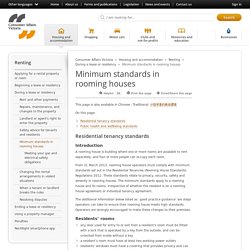
From 31 March 2013, rooming house operators must comply with minimum standards set out in the Residential Tenancies (Rooming House Standards) Regulations 2012. The additional information below listed as `good practice guidance’ are steps operators can take to ensure their rooming house meets high standards. Residents’ rooms any door used for entry to or exit from a resident’s room must be fitted with a lock that is operated by a key from the outside, and can be unlocked from inside without a key a resident’s room must have at least two working power outlets residents’ windows must have a covering that provides privacy and can be opened and closed by the resident.
Good practice guidance: Bathrooms Kitchens. Raav_handbook.pdf. Standards in Rooming House and Rental Accommodation. The department has developed two fact sheets to give guidance on legal requirements for rooming house and general rental accommodation.
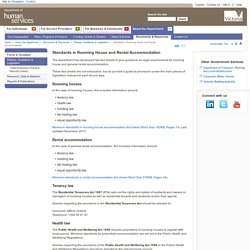
These fact sheets are not exhaustive, but do provide a guide to provisions under the main pieces of legislation relevant to each tenure type. Rooming houses In the case of rooming houses, this includes information around: tenancy law health law building law fair trading law equal opportunity law. Minimum standards in rooming house accommodation fact sheet (Word Size 182KB, Pages 14) Last updated December 2013. Rental accommodation In the case of general rental accommodation, this includes information around: tenancy law building law fair trading law equal opportunity law.
Minimum standards in rental accommodation fact sheet (Word Size 578KB, Pages 20). Health Wellbeing and Accommodation Businesses. Introduction Frankston City's Health Services seeks to ensure Beauty Therapy businesses, Hairdressers, Tattooists, Body piercing businesses and Accommodation businesses are clean, safe and operating in accordance with the Health and Well Being Act 2008 (commencing January 2010).
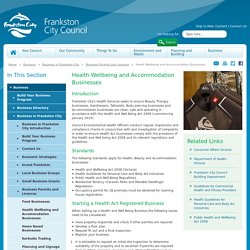
Council Environmental Health Officers conduct regular inspections and compliance checks in conjunction with and investigation of complaints in order to ensure Health Act businesses comply with the provisions of the Health and Well being Act 2008 and its relevant regulations and guidelines. Standards The following standards apply for Health, Beauty and Accommodation businesses: